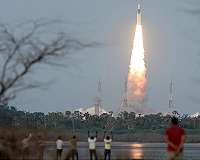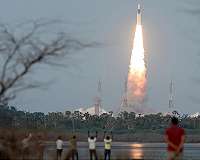The proposed launch vehicle or rocket policy should be startup friendly, not be restrictive in terms of minimum capital for the company, rocket size and other things and the criteria be clear and upfront, said top officials of two rocket companies. They also said the private rocket makers are start-ups which the proposed policy should take into account and the damage liability is one of our major concerns.
“It is a welcome move on the part of the government to have a policy for satellite launch vehicles or rockets. However, the proposed policy should be start-up friendly as all the private rocket makers are start-ups,” Pawan Kumar Chandana, Co-Founder, CEO and CTO of Skyroot Aerospace said.
On Tuesday, K. Sivan, Secretary, Department of Space (DOS) announced that the government will come out with new policies for launch vehicles, space exploration and also a comprehensive Space Act.
“The proposed policy should be start-up friendly and not restrictive in terms of minimum capital requirements for rocket makers. That apart, the policy should also lay down the norms for sharing of damage liability between the private rocket makers and the government,” Chandana said.
“The launch licensing guidelines should be clear. The criteria to allow companies to launch rockets should be explicit. Similarly, the guidance on the end user of the satellite should also be clear so that the companies are not put to difficulty later,” Srinath Ravichandran, co-founder and CEO Agnikul Cosmos Pvt Ltd told IANS.
The other issues faced by the rocket launch companies are the damage to properties orbiting in space and located on the ground.
“The damage to third party properties – orbiting in the space or on the ground- by a rocket built and owned by a start-up can break the companies in the nascent sector if they have to bear the liability in full,” Chandana said. He wants part of the liability to be shared by the government at least in a graded manner – based on the turnover or number of launches or other manner.
“The liability norms should also be such that there is a level playing field for all including Indian Space Research Organisation (ISRO),” Chandana said. “Though there is no clarity on the space liability insurance, the premium should also not be high. On the other hand, the insurance for property damage on the ground could be like that of the aviation insurance,” he added.
According to Chandana, ISRO normally formulates policies for established corporates laying down turnover norms. But this time around the policies should take into account the needs of start-ups. On the status of Skyroot’s rocket Vikram Chandana said in six months’ time, two stages/engines will be tested.
“Ours is a four stage rocket with the first three stages powered by solid fuel and the fourth one by liquid fuel. The fourth stage engine has already been tested. The navigation systems are developed inhouse,” he said.
The 20-metre rocket with a carrying capacity of about 300 kg is being built with composites and carbon fibre to make it lighter. “We are using metal matrix composites in our liquid engine and carbon fire in our solid motors,” he said. (IANS)
Source: IANS
Related Links
ISRO
The latest information about the Commercial Satellite Industry
|
Thanks for being there; We need your help. The SpaceDaily news network continues to grow but revenues have never been harder to maintain.With the rise of Ad Blockers, and Facebook – our traditional revenue sources via quality network advertising continues to decline. And unlike so many other news sites, we don’t have a paywall – with those annoying usernames and passwords.Our news coverage takes time and effort to publish 365 days a year.If you find our news sites informative and useful then please consider becoming a regular supporter or for now make a one off contribution. |
||
|
SpaceDaily Monthly Supporter $5+ Billed Monthly |
||
paypal only
SpaceDaily Contributor
$5 Billed Once
credit card or paypal
Dragonfly Aerospace emerges from SCS Aerospace Group
Cape Town, South Africa (SPX) Sep 02, 2020
Dragonfly Aerospace picks up the flag in the latest chapter in the proud history of South African space engineering and space missions.
This history starts with the national space program of the 1980s and plots a path through seven satellites and another six payloads built and launched with local and international customers along the way. Most recently, the team delivered a hyperspectral imager due for launch later this year.
“Dragonfly Aerospace envisions a future where our compact, high-pe … read more
– Advertisement –


